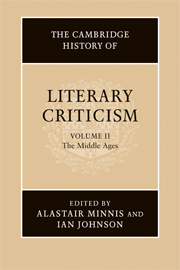Book contents
- Frontmatter
- Introduction
- I THE LIBERAL ARTS AND THE ARTS OF LATIN TEXTUALITY
- II THE STUDY OF CLASSICAL AUTHORS
- III TEXTUAL PSYCHOLOGIES: IMAGINATION, MEMORY, PLEASURE
- IV VERNACULAR CRITICAL TRADITIONS: THE EARLY MIDDLE AGES
- V VERNACULAR CRITICAL TRADITIONS: THE LATE MIDDLE AGES
- VI LATIN AND VERNACULAR IN ITALIAN LITERARY THEORY
- 20 Dante Alighieri: experimentation and (self-)exegesis
- 21 The Epistle to Can Grande
- 22 The Trecento commentaries on Dante's Commedia
- 23 Latin and vernacular from Dante to the age of Lorenzo (1321–c. 1500)
- 24 Humanist views on the study of poetry in the early Italian Renaissance
- 25 Humanist criticism of Latin and vernacular prose
- VII BYZANTINE LITERARY THEORY AND CRITICISM
- Bibliography
- Index
- References
24 - Humanist views on the study of poetry in the early Italian Renaissance
from VI - LATIN AND VERNACULAR IN ITALIAN LITERARY THEORY
Published online by Cambridge University Press: 28 March 2008
- Frontmatter
- Introduction
- I THE LIBERAL ARTS AND THE ARTS OF LATIN TEXTUALITY
- II THE STUDY OF CLASSICAL AUTHORS
- III TEXTUAL PSYCHOLOGIES: IMAGINATION, MEMORY, PLEASURE
- IV VERNACULAR CRITICAL TRADITIONS: THE EARLY MIDDLE AGES
- V VERNACULAR CRITICAL TRADITIONS: THE LATE MIDDLE AGES
- VI LATIN AND VERNACULAR IN ITALIAN LITERARY THEORY
- 20 Dante Alighieri: experimentation and (self-)exegesis
- 21 The Epistle to Can Grande
- 22 The Trecento commentaries on Dante's Commedia
- 23 Latin and vernacular from Dante to the age of Lorenzo (1321–c. 1500)
- 24 Humanist views on the study of poetry in the early Italian Renaissance
- 25 Humanist criticism of Latin and vernacular prose
- VII BYZANTINE LITERARY THEORY AND CRITICISM
- Bibliography
- Index
- References
Summary
This chapter is concerned with the arguments put forward by Italian humanists in the fourteenth and fifteenth centuries as to how and why poetry should be read, and therefore with one of the central themes of literary criticism, or more exactly literary theory, in the early Italian Renaissance. (The date from which the Renaissance starts is a matter over which opinions legitimately differ; here, as far as Italy is concerned, I am using the expression ‘early Renaissance’ to cover the fourteenth and fifteenth centuries.) The study and imitation of the classical poets was, of course, a major humanist interest, and poetry occupied an important place in the new curriculum of secondary education. But of all the subjects with which the humanists were concerned it was also the most contentious. In the fourteenth and fifteenth centuries Italian humanists were attacked from a number of quarters because of their poetic interests. The attack came from theologians, monks and the clergy, as well as from members of the established professions of law and medicine. Its main substance was the argument that classical poetry distracted men's minds from better things with stories that were not only pagan and therefore mendacious, but also lascivious and immoral. Moreover, they had been condemned both by classical figures such as Plato and Boethius and by Fathers of the church; ‘the songs of the poets are the food of devils’, St Jerome wrote for instance (Epist. 21.13 [CSEL 54]; see also Plato, Rep. 2.376-3, 403 and Boethius, De cons. phil. 1 met. 1).
- Type
- Chapter
- Information
- The Cambridge History of Literary Criticism , pp. 626 - 647Publisher: Cambridge University PressPrint publication year: 2005
References
- 1
- Cited by

